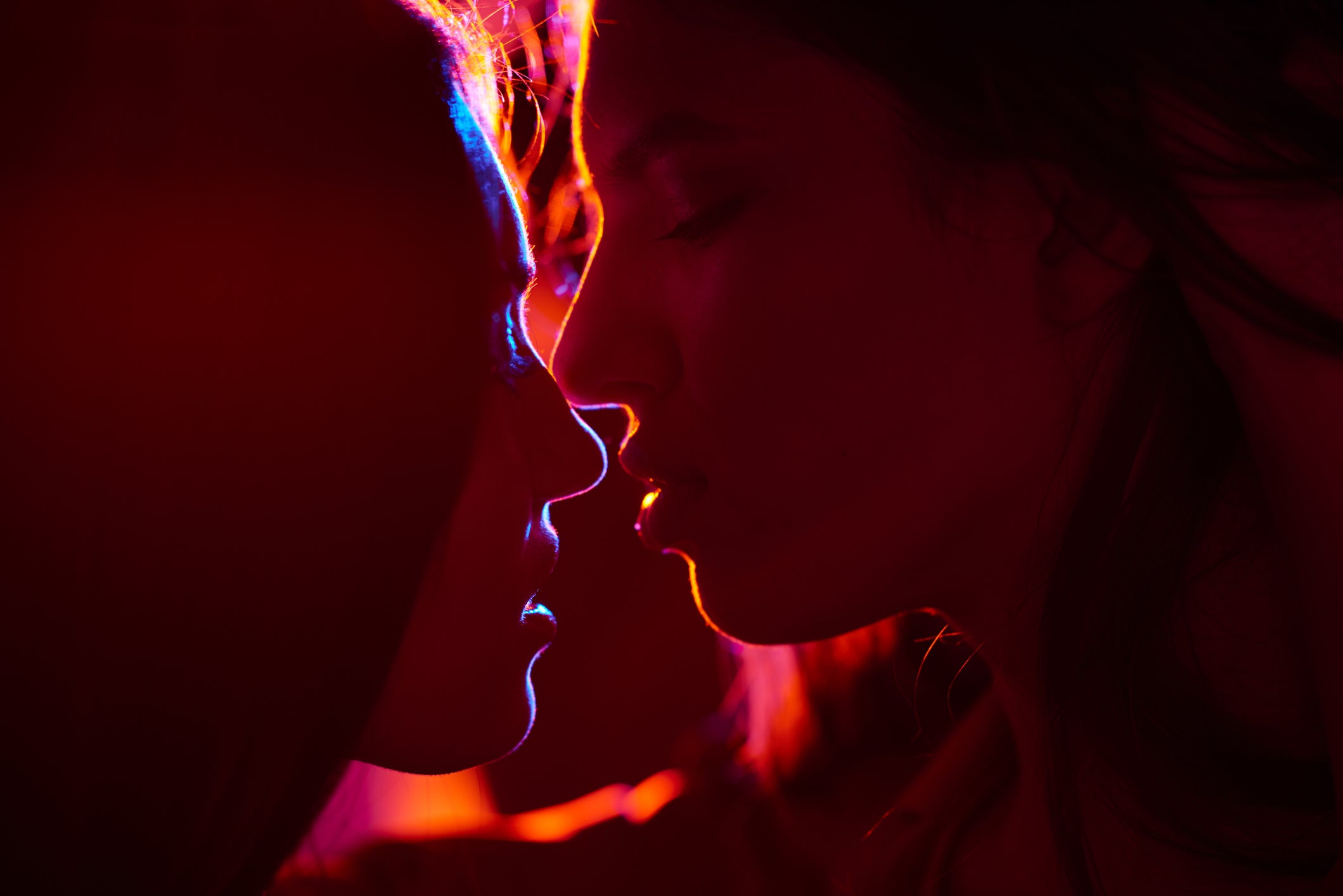Get off Feeld if you’re ‘vanilla’ – it’s not for you and that’s OK

Please don’t judge me, but I have a very specific kink. I’ve had it for years – possibly my whole life, or at the very least since puberty – and it’s only deepened over time. I’m not quite sure I should be writing this in a national news publication (my mum could be reading, after all), but here goes: I have this thing for exclusively dating one man at a time, getting to know them, developing physical intimacy in line with emotional connection, and committing to a monogamous, loving, long-term relationship with a view to potentially getting hitched and starting a family.
Yes, it’s embarrassing to admit to. No, there’s nothing I can do to change it.
Look, I really have tried. I had my approximation of a “hot girl summer” (it mainly involved wearing nice dresses and necking too much rosé). I’ve snogged strangers outside bars and on occasion dated more than one person concurrently (I lasted all of two weeks before the admin got too stressful). But after 38 years on this planet, I have to finally accept the truth: this fetish isn’t going anywhere. I’m simply never going to have my “slut phase” or deep-dive exploration into my sexual identity à la Michelle Williams in Dying For Sex. It’s just not who I am.
Instead, I’m one of those hopelessly “vanilla” people whose orientation and preferences when it comes to love and sex are so basic as to be barely worth mentioning – the dating equivalent of a “Live, Laugh, Love!” poster or a pumpkin-spice latte. And it’s why, despite regularly cycling between relationships and singledom, I’ve never once contemplated using the sex-positive dating app Feeld.
Developed by designer Dimo Trifonov and his partner Ana Kirova in 2014 – and inspired by their own experiences as a couple in London who were exploring non-monogamy – the app started life as more niche than mainstream, a safe place for sexual experimentation aimed at those operating outside the confines of the heteronormative, monogamous status quo.
“We’re on a mission to elevate the human experience of sexuality and relationships,” reads the website blurb. “Feeld is a dating app for the curious; those open to experiencing people and relationships in new ways. Polyamory, consensual non-monogamy, homo- and heteroflexibility, pansexuality, asexuality, aromanticism, voyeurism, and kink are just a few of the sexual identities and desires that make up the Feeld community.”
And indeed, Feeld puts those preferences front and centre, with every kink you can think of (and probably some you can’t) listed and available to be added to your profile, with the functionality to filter matches by what you’re looking for in the bedroom. Catering for a diverse community who were largely being ignored by other apps on the market, Feeld slowly gathered momentum before exploding in popularity in recent years.

But there’s a catch. Since 2022, its user base has grown by 30 per cent year on year – a huge feat amid a floundering industry in which other major platforms are on the decline (the UK’s top 10 dating apps have seen a fall of nearly 16 per cent, according to a 2024 Ofcom report). It’s not necessarily that the community Feeld was designed to serve is growing, though; a more likely explanation is that the app is being flooded by “vanilla tourists”, CEO Kirova has said.
Reaching a wide audience was never the goal, she told the Guardian, and she worries that this proliferation of more conventional daters could put off the app’s long-term clientele.
“I do think it’s a challenge that it’s becoming more mainstream in some ways,” she said. “How do we welcome people who’ve never heard of Feeld, who don’t understand the list of sexualities and genders [or] who don’t understand what ethical non-monogamy is?”
And yet, having positioned itself as one of the most inclusive apps on the market, Feeld can hardly be seen to be purposefully excluding anyone. “Every time someone tells me about these vanilla people being on the app, I just ask: ‘What’s the problem with vanilla?’ Why are we so binary about it?” Kirova added. “There is vanilla, which is boring and whatever, and then there is the rest, which is dark and interesting. We don’t yuck anyone’s yum … and that does count for more traditional relationships and popular sexual experiences, too. I think there is space for that.”
None of us can help how we’re made – even the boring ones
But the question is, why? Why use an app geared towards a specific demographic when you are very much not a part of that demographic? Why go looking for traditional dating on Feeld when there are any number of apps already set up for all your run-of-the-mill wants and needs?
I hate being told I’m not welcome anywhere, but you’ve got to admit that it seems somewhat perverse to ignore the plethora of platforms where “vanilla” is already the predominant flavour – Hinge, Bumble, Happn, Match, OK Cupid, Plenty of Fish, Tinder – to go on some kind of voyeuristic “kink safari” when you have no real intention of getting spicy yourself. It would be like me, a cis-het woman, joining Grindr for vicarious, salacious thrills. Just because I could, doesn’t mean I should.
Even anecdotally, I’ve noticed more people I know talking openly about signing up to Feeld. For some, it makes sense – one friend is embarking on the X-rated odyssey of a lifetime and I’m delighted for her. For most, it seems like they’ve done it simply because it’s the new thing to do, the only app that still seems fresh and cool and hasn’t yet lost its sheen the way the rest of them have.
I’m sure these beige daters cosplaying as unicorns have been driven to the wild side, in part, because of their lacklustre experiences on the established apps. What with all the dead accounts, timewasters chasing a dopamine hit rather than an actual date, messaging that goes nowhere, ghosting and the very real risk that you could be chatting up an AI, it’s unsurprising that disgruntled singles are sniffing around elsewhere in the hope of something better.

More than 90 per cent of Gen Z feel frustrated with dating apps, according to youth research agency Savanta. Some 78 per cent of dating app users say they feel “emotionally, mentally, or physically exhausted” by them, according to a 2024 study by Forbes Health, while a 2023 YouGov survey found that 46 per cent of Brits say their dating app experiences have been bad. But the answer surely isn’t for everyone to simply migrate to Feeld to ruin that too.
Perhaps users also are reacting against a perceived modern kind of stigma – that everyone should be fluid in some way these days, or “discovering themselves”, or open to ENM (ethical non-monogamy), or eschewing traditional sexual labels while taking on a whole bunch more. In this brave new world, it can feel like there’s a pressure to present as something more exciting or exotic than many of us are in reality. Admitting that your bog-standard proclivities stack up to wanting to split utility bills with the same person you have sex with three times a week feels like admitting defeat. But none of us can help how we’re made – even the boring ones.
I’m all for there a being a beautiful, sexually open playground for all the wonderful free spirits out there; the last thing anyone needs is the likes of me diluting it with my tedious conventionality. Look, it’s OK to be bland in your tastes. It’s OK to be dry in your relationship goals. Just stay in your dating lane, redownload Hinge if you must, and leave the kinky stuff to the people with actual kinks.
[title_words_as_hashtags




